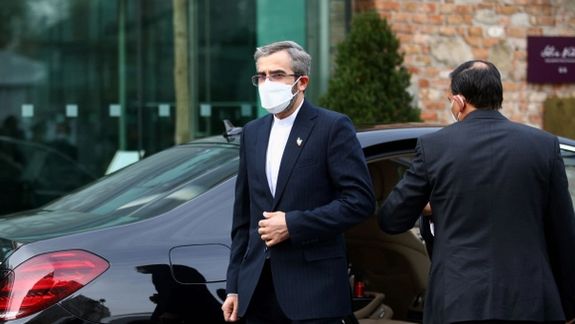Iran's Top Negotiator Returning To Vienna 'To Resolve Remaining Issues'

Iran's top nuclear negotiator Ali Bagheri-Kani, who returned to Tehran Wednesday, is returning to Vienna Sunday evening to resume talks, local media reported.

Iran's top nuclear negotiator Ali Bagheri-Kani, who returned to Tehran Wednesday, is returning to Vienna Sunday evening to resume talks, local media reported.
Bagheri-Kani will leave for Vienna with a "clear working plan" to resolve the remaining issues and "significant challenges", Nour News which is affiliated with the secretary of Iran's Supreme National Security Council (SNSC), Ali Shamkhani, said Sunday in an "exclusive report".
Nour News said the talks have reached an "agreement or dead-end borderline". "Continuation of the Western sides' unacceptable approach to resolving the remaining issues has unnecessarily dragged the talks and brought about unpredictable circumstances," it said.
Reports received by Iran International on Saturday spoke of a “an immediate deadline” imposed by Washington for receiving a clear answer from Tehran on a draft agreement.
Iran insists on the removal of more sanctions that the United States is willing to lift, verification of sanctions removal, and presentation of “absolutely necessary objective guarantees for the fulfilment of commitments,” Foreign Minister Hossein Amir-Abdollahian said in an address at the Munich Security Conference on February 19.
Tehran seeks an iron-clad guarantee that the United States will not change its mind in the future as former president Donald Trump did in 2018, withdrawing from the JCPOA.
Some pundits say the Ukraine crisis may delay an agreement on the restoration of the JCPOA, particularly because there has yet been no concrete agreement on exactly which sanctions are to be lifted, the timeframe for the lifting of sanctions and verification, the guarantee that Iran insists on, and the fate of Iran's advanced IR-6 centrifuges.
Iran standing firm on its deamnds
Nour News added that an SNSC meeting last night, which was also attended by members of the negotiation team and Parliament Speaker Mohammad-Bagher Ghalibaf, has decided that the acceptance of a deal would depend on a decision on these issues.
This means there is no real change in Iran’s position as Bagheri-Kani returns to Vienna. The Biden Administration must decide to continue talks or resort to another strategy as it has said before. So far, the administration seems willing to continue engagement, even with Russia as an active participants in the talks.
Amir-Abdollahian in a tweet Saturday said he had held a phone talk with the EU foreign policy chief Joseph Borrel and that Bagheri-Kani had also been in contact with Enrique Mora, European Union's lead negotiator on Iran's nuclear issue. "Our red lines are made clear to western parties. Ready to immediately conclude a good deal, should they show real will," he wrote.
Deputy Speaker of the Parliament, Abdolreza Mesri, on Sunday said the National Security and Foreign Policy Committee is going to hold an extraordinary session with Amir-Abdollahian Tuesday on the latest developments in Vienna. The parliament held a closed session Sunday morning during which, according to Tasnim News Agency, Ghalibaf offered a report on the current situation of the talks.
Last week over 250 of the 290 lawmakers of the Iranian parliament in a letter to President Ebrahim Raisi demanded that all sanctions, including those related to terrorism, missile development and human rights and those imposed by the Iran Sanctions Act (ISA), the Countering America's Adversaries Through Sanctions Act (CAATSA), and CAATSA U-Turn, should be lifted.
Morteza Mahmoudvand, a member of the National Security and Foreign Policy Committee on Sunday said news from agreements made in Vienna were worrying and the government should be held to account if it failed to comply with the parliament's controversial legislation of December 2020.
The legislation which the administration of President Hassan Rouhani said unnecessarily escalated the nuclear standoff with the West obliged the government to start 20 percent uranium enrichment, in breach of the JCPOA) and to halt Iran's voluntary implementation of the Additional Protocol of the Non-Proliferation Treaty (NPT).